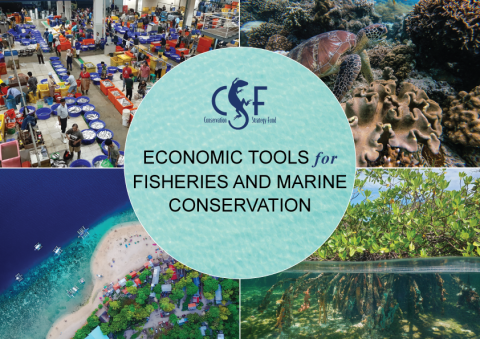
About the Course
Conservation Strategy Fund is now accepting applications for our two-week intensive course: Economic Tools for Fisheries and Marine Conservation. This course will be held virtually from March 22 through April 2, 2021 for participants across Indonesia. During this course, participants will be introduced to key elements of economic and quantitative tools for economic analyses, as well as practical tools for governance and policy design. Topics will include: an introduction to economics, microeconomics, macroeconomics, natural resource economics, quantitative economic analysis, fisheries economics, conservation economics, impact evaluation, ecosystem service valuation, cost-benefit analysis, as well as policy and governance. All of these areas of study will be linked to practical real-world applications for fisheries management and marine conservation.
This course is made possible with the generous support of The David and Lucile Packard Foundation.
Virtual and Online
In response to the ongoing COVID-19 pandemic, Conservation Strategy Fund will be offering our course in an interactive, distance-learning format to ensure the safety of our participants and partners. Participants will join highly-qualified professors, fellow environmentalists, and expert speakers for a two-week virtual and online experience that will include pre-recorded lectures, discussion platforms, live interactive sessions, small group discussions, and on-demand resources.
Training Structure and Expectations:
There will be an orientation held over Zoom with all course participants one week prior to the start of the course to provide an overview of the distance-learning format, online platform, and technology.
The training will consist of two components: (1) live online sessions and (2) flexible offline sessions. Participants are expected to watch and review materials presented in pre-recorded video lectures and any reading materials provided prior to the start of the session. Participants will need a reliable internet connection via their computer or phone to participate in live sessions and to access online materials.
Participants will be expected to attend 3.5-4 hours of live online class each morning, split into two sessions. Each live session will include a 30-60 minute summary session by the lecturer, followed by a discussion and questions period from participants for 60 minutes. Additional live economic game sessions will be planned for a few afternoons during the course. For the flexible offline sessions, participants are required to arrange their own time to review the materials and prepare questions for the instructors during the live online sessions. Any questions or topics for discussion should be posted on the WhatsApp forum group provided by CSF. It is expected that participants will dedicate an additional 1-2 hours per day for reviewing the offline materials and engaging in the WhatsApp group. For any game or exercise session, the assignment will be distributed prior to the online session. The online game and exercise sessions will be conducted using breakout rooms with a facilitator in each room and 5-10 participants per breakout room.
Benefits
CSF course participants experience a transformational shift in the way they approach their work, and our alumni are already using what they have learned in the field to make stronger economic arguments for sustainable fisheries management and marine conservation. Participants will gain the theoretical and working knowledge they need to better design and evaluate marine resource programs and policies. In addition, participants will be able to use economic tools and insights in their work to make the case for sustainable development and fisheries management strategies. Past participants include policy advisors, conservation practitioners, and natural resource managers.
Instructors
The course will be taught by instructors from CSF staff, international economic experts, leading academics at international universities like the University of Wisconsin-Madison, as well as professors from Indonesia’s leading universities such as IPB University, Indonesia University, Gadjah Mada University, and researchers from the Ministry of Marine Affairs and Fisheries. Our expert instructors for this year's course include Alin Halimatusadiah, Christy Desta Pratama, Kim Bonine, Yudi Wahyudin, Rimawan Pradiptyo, David Johnson, Luky Adrianto, Umi Muawanah, and many others.
Course Topics
Week 1
- Overview of fisheries policy and marine conservation in Indonesia
- Macroeconomics and Indonesian development
- Economic fundamentals, microeconomics, behavior, and public policy
- Natural resource economics and fisheries bioeconomics
- Fisheries economics, management, and policy
Week 2
- Economics of marine conservation and tourism
- Ecosystem services and environmental valuation
- Economic impact evaluation, leakage, and economic multipliers
- Cost-benefit analysis of projects and policies
- Public policy and governance, as applied to fisheries and marine conservation
Eligibility
The course is for Indonesian students and professionals working in government institutions or other relevant fields, who are interested in how economics and governance can improve the overall sustainability of fisheries and marine conservation management throughout Indonesia. Areas of interest include, but are not limited to: (i) Government agencies, (ii) Researchers, (iii) Academics, (iv) Private Sector, and (v) Civil Society Organizations.
Application and Selection
Economic Tools for Fisheries and Marine Conservation will be held from March 22-April 2 of 2021. The deadline for applications is March 9, 2021. Eighteen participants will be selected from the applicants to this training program through a competitive application process, and they will be joined in the course by the 12 fellows selected to CSF's 2021-2022 Marine Fellowship Program. Selection will be based on several criteria including, but not limited to: previous work experience in the fisheries and marine sector in Indonesia, relevant work experience in conservation, economics, development, or a similar field, eagerness to learn, commitment to attend all of the sessions throughout the course (particularly during the live morning online sessions), and English language proficiency.
Those who are interested should fill out the application form here by March 9.
Come and join us!
